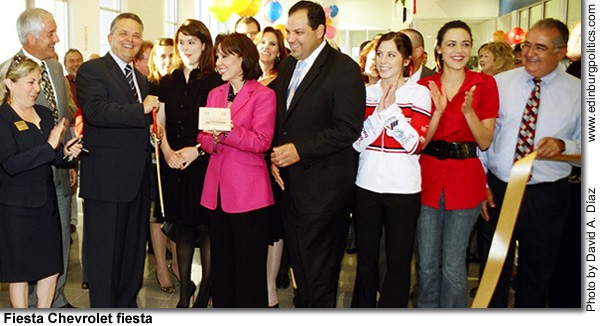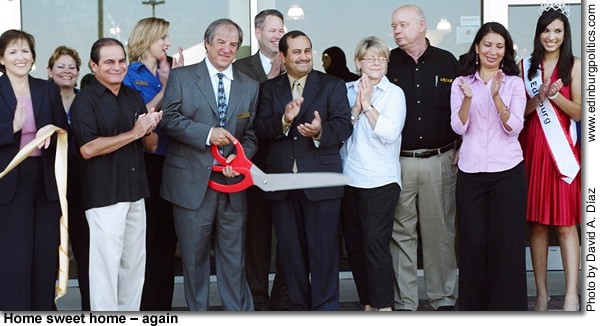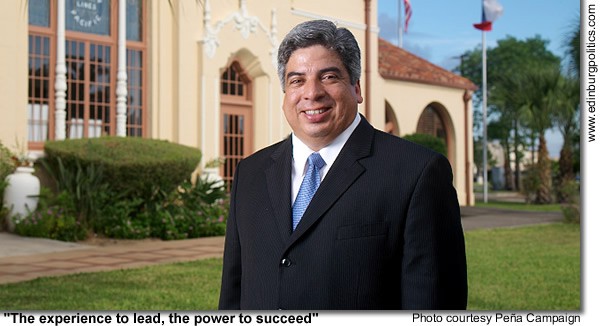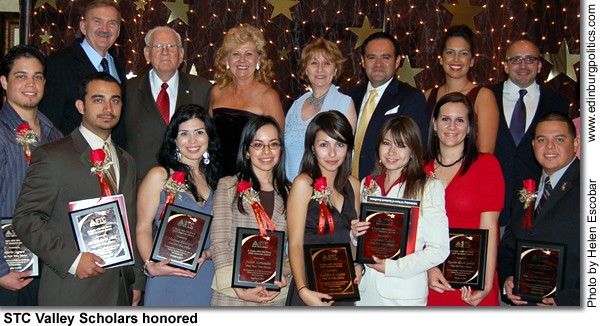What is good for the Texas border region is good for Texas, says Farouk Shami

What is good for the Texas border region is good for Texas, says Farouk Shami, featured here shaking hands with a young supporter during his early February campaign swing through McAllen. Shami, who is seeking the March 2 Democratic Party primary for governor, has laid out his policies for helping the Texas border region. His plans include promoting industry cluster development along the border, increasing educational opportunities on the border, building new infrastructure along the border, and ensuring all Texans living along the border have access to healthcare and educational resources, according to top campaign leaders. "Industry cluster development is my plan to work with local officials on each side of the border to build high-skill, capital-intensive factories on the U.S. side of the border and have them partner with low-skill, labor-intensive facilities on the Mexican side of the border," said Shami. "This lowers the cost of manufacturing and allows companies to build products at a low price while ensuring the highest quality possible," he added. "Promoting these will eliminate any incentives to outsource to China and India." See lead story in this posting.
••••••

Rep. Armando "Mando" Martínez, D-Weslaco, on Monday, February 22, provided veterans groups leaders meeting at Weslaco City Hall on his specific plan to secure state funds to help pay for the construction of a Veterans Administration Hospital for the Rio Grande Valley. He said he will file legislation in 2011 to tap into the Texas Enterprise Fund and the Texas Emerging Technology Fund – which together have several hundred million dollars in reserves – to get the long sought-after hospital for the region. Featured, from left: Rep. Rene Oliveira, D-Brownsville; Rep. Martínez; Ana García, representing Sen. John Cornyn, R-Texas; and Julian Álvarez, representing Sen. Kay Bailey Hutchison, R-Texas. See story by Treto Garza, veterans affairs columnist for the Rio Grande Guardian, later in this posting.
••••••

Key Valley legislators, including Rep. Aaron Peña, D-Edinburg, Rep. Rene Oliveira, D-Brownsville, and Rep. Veronica Gonzales, D-McAllen, met in Weslaco on Monday, February 22, with the Veterans Alliance of the Rio Grande Valley, which is lobbying for the construction of a Veterans Administration Hospital for the Rio Grande Valley. A few days after that session, Homer Gallegos, the chair of organization, said the group is reactivating a Veterans Alliance strike force to assure that Valley veterans are kept updated on similar events being held in South Texas. "The strike force is a group of veterans from the Veterans Alliance who volunter to be on call in case an important meeting or event is scheduled," said Gallegos. "Many a times there are events, community activities, local governmental meetings and other gatherings that discuss veterans issues and health issues. The Veterans Alliance sometimes get last-minute notice of these events. The strike force will assure that the veterans are represented." In the coming days, the Strike Force will see its first action, including meeting with Harlingen Mayor Chris Boswell in the Harlingen Town Hall room and a meeting with the new Catholic bishop for the Valley – the Most Reverend Bishop Manuel Flores, Catholic Diocese of Brownsville. That meeting is sheduled to be held Brownsville. More information is available by contacting Gallegos at 956/878-6144.
••••••

South Texas College recently hosted a special breakfast at its Mid-Valley Campus to recruit mentors for its Valley Scholars Program. "The most important message I have for all of our students in South Texas is that no one is smarter than they are – period," said Rep. Armando "Mando" Martínez, D-Weslaco, who is one of the mentors. "That’s why I work so hard to bring the best higher educational opportunities, such as the medical school, and in the near future, a law school, to the Valley. Our students have what it takes to reach for the stars." Featured, front row, from left: Rep. Armando “Mando” Martínez; and STC Valley Scholars Ángel Chavero, Elizabeth Becerra, Nora Macareno, Paula Noel, Elizabeth Pat and Diana Ruiz. Back row, from left: Anahid Petrosian, assistant to the STC vice president for academic affairs; Juan Mejia, STC vice president of academic affairs; STC Valley Scholar Joshua Domínguez; Monte Churchill, STC Mid-Valley Campus site coordinator; and STC Valley Scholars Dakotah Fernández and Janet Martínez; and Weslaco Mayor Buddy de la Rosa. Mentors for STC’s Valley Scholars Program make a significant difference in the lives of the students they mentor. Mentors serve as role models by sharing personal and work experiences with students. They should expect to attend monthly meetings during each academic semester; attend special events and activities; correspond with mentees via e-mail and phone; and possibly take students to luncheons or other motivational activities and field trips. See related story.
••••••

South Texas College’s fifth annual summit on college readiness was the stage for more than 250 educators from across the Rio Grande Valley of Texas to decide that they would be the ones to set the national standard for college readiness. How are they going to accomplish it? By creating a unified, college-going culture. “We gather to show the data and how we are doing in preparing students for the challenges of college; it’s not about pointing fingers, rather collaborating on how we can do things better,” said STC President Shirley A. Reed. “A strong college-going culture throughout a child’s school experience is the strongest predictor of going to college. We, as a region, have hit a plateau with only 60 percent of our students going to college. We need to build a culture where college-going is an expectation for all, not just an opportunity for a few.” Featured, from left: President Reed; President Nelson; Katherine Boswell, director of the Center for Community College Policy for the Academy for Education Development; Anna H. Rowan, K to 12 policy analyst for The Education Trust; and Mary Treviño, Region One Education Service Center PEIMS coordinator. See story later in this posting.
••••••

The David Rodríguez family of Edinburg won the Which Wich FRIENDShip Basket Raffle at the Museum of South Texas History’s Pioneer and Ranching Crafts Day. Which Wich franchise owners Debbie Wilson and Chad Wilson generously donated the basket, filled with delicious Which Wich treats, to MOSTHistory for the FRIENDShip Raffle. All individuals who purchased a FRIEND membership at the event were entered in the drawing. FRIEND Memberships support the mission and operation of the Museum of South Texas History. To purchase or renew your FRIENDShip, call Lynne Beeching at/or visit http://www.mosthistory.org. The Museum of South Texas History is located on the Hidalgo County Courthouse Square in downtown Edinburg. Featured, from left: Family friend Sylvia J. Reash; Patricia Rodríguez; David Rodríguez; Alejandro A.Rodríguez; and Andrea A. Rodríguez.
••••••

Manic Monday Blues are suffered by many. The McAllen Hispanic Chamber has discovered a sure way to get rid of those blues. They celebrate at a Manic Monday Mixer and guarantee to rid the blues from it’s members and future members. On Monday, March 1, the Manic Monday Mixer will be hosted at The Patio at Guerra’s, located at 116 S. 17th in the Entertainment District of McAllen. The Manic Monday Mixer will be held from 5:30 p.m. to 7:30 p.m. The McAllen Hispanic Chamber invites the community to come and meet MHCC members and network. Making business contacts will surely make Monday a productive and enjoyable day. Food and refreshments will be offered at special prices. Featured, from left: Art Guerra, Jr., co-owner; Cynthia M. Sakulenzki, MHCC president and chief executive officer, and Che Guerra, co-owner.
••••••


























